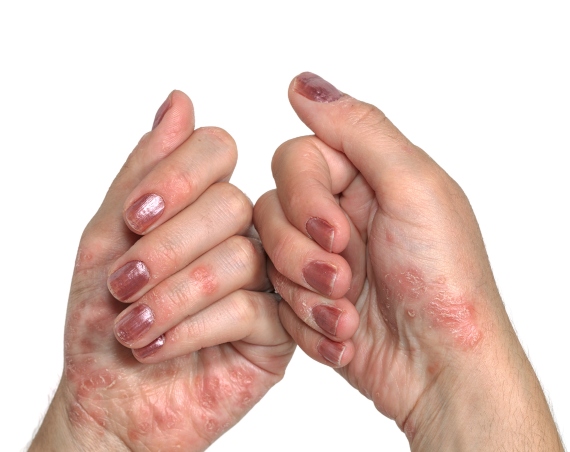Psoriasis is a commonly known autoimmune disease that affects 8 million Americans and more than 125 million individuals across the world. When skin cells reproduce too quickly as a result of the immune response this results in Psoriasis. A symptom of Psoriasis is caused by the body’s inability to shed cells as they produce, causing areas of red, thickened and scaly patches of skin.

Illustration showing where Psoriasis affects skin cells.
Psoriasis is a genetic autoimmune disorder but can become worse from illness, stress, alcohol and other potential factors. If the overproducing cells make their way to the oral cavity you may start to see lesions in the mouth. Oral lesions are typically rare. In some cases patchy lesions on the lips are one of the first signs of psoriasis if you’ve not been diagnosed yet. It is best to speak to your dermatologist and dentist if you’ve already been diagnosed and notice lesions beginning in your mouth.
There are 5 different types of Psoriasis:
-Plaque Psoriasis: When most people hear the term psoriasis they usually think of this type. It is characterized by scaly patches of skin that can often be itchy and may even crack and bleed.
-Guttate: Shows as small round lesions that usually appear during childhood and may even be triggered by a strep infection, which is common among children.
-Inverse: Inverse psoriasis is often found in combination with other types of the disease. These shiny lesions are usually seen in skin folds such as: behind the knees, in the underarms, etc.
-Pustular: This form presents like white pustules that may look like an infection but is not. The pustules are filled with white blood cells as a result of the immune response. This type usually is reflected in the hands and feet.
-Erythrodermic: Erythrodermic psoriasis is often found in individuals with uncontrolled plaque psoriasis. This form is rare and is particularly severe. It is seen as an extremely itchy, painful, redness all over the body that can cause the skin to peel. This form of psoriasis can be life-threatening. If it starts to appear, you should see a doctor immediately.
Research
Research is still underway to determine exactly how this particular disease affects oral health other than its manifestation and there are still a lot of unknowns regarding their correlation. A Norwegian study found 24% of participants with psoriasis had moderate to severe periodontitis, but only 10% of the control group without psoriasis suffered from moderate to severe periodontal disease. When the study was completed, they concluded that the link between the two diseases is likely involved in the immune response. More research is needed to further understand what, if any, impact periodontal disease and psoriasis have on each other.
Any form of psoriasis can be very hard to deal
Any form of psoriasis can be very hard to deal with and it is our hope that we will gain a greater further understanding as research continues. If a link is found between psoriasis and periodontal disease, we will do our best to strive for treatment that could ease symptoms of both diseases. If you suffer from psoriasis or any autoimmune disease, we can hypothesize that good oral health can often improve symptoms. At Innovative Dentistry at SLU, our goal is to treat patients with the best care possible. For us this means adjusting treatment to do more and see how we can help to improve other diseases you may suffer from. Good oral health is good overall health! If you suffer from psoriasis and would like to discuss how we can further improve your oral health, we would be happy to discuss this with you at your next visit.
References/Resources
Colgate: https://www.colgate.com/en-us/oral-health/conditions/immune-disorders/how-to-treat-your-psoriasis-mouth-symptoms-0715
National Psoriasis Foundation – https://www.psoriasis.org/advance/gum-disease-more-likely-in-people-with-psoriasis
https://www.psoriasis.org/about-psoriasis/types/plaque
https://www.psoriasis.org/about-psoriasis/types/guttate
https://www.psoriasis.org/about-psoriasis/types/inverse
https://www.psoriasis.org/about-psoriasis/types/pustular
https://www.psoriasis.org/about-psoriasis/types/erythrodermic
NCBI – https://www.ncbi.nlm.nih.gov/pmc/articles/PMC4280688/
Mayo Clinic –https://www.mayoclinic.org/diseases-conditions/psoriasis/symptoms-causes/syc-20355840
